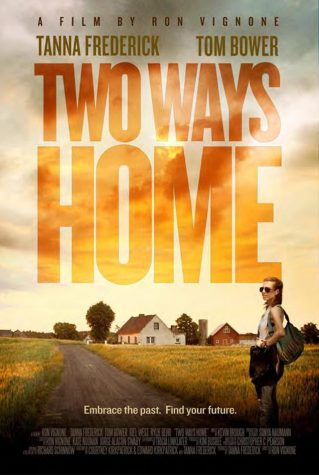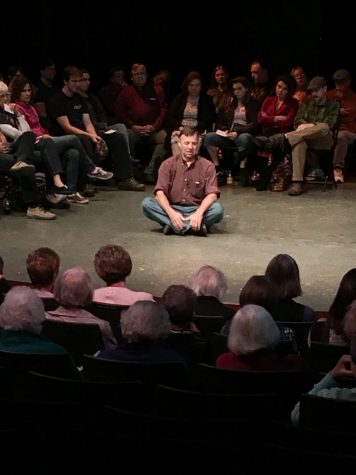“Two Ways Home” in review
April 1, 2021
Last week, The Gesa Powerhouse Theater screened “Two Ways Home,” an independent film directed by Ron Vignone, an award winning director who specializes in deeply personal films about American lives. The film was a dramatic representation of living with mental illness and the struggle to find human connection after family separation.
“Two Ways Home” is an attempt at authentically representing rural America. It is true that Vignone is, himself, from a small town in Iowa. The images of rolling hills and beautiful farmland set a firm contrast to the factory farming and industrialization that seems to employ many of the film’s cast.
The result of this setting is a sense of nostalgia for a simpler, country life in the face of a rapidly changing world. The film is a sort of love letter for country life while also dealing with some of the very real complexities of life.

The protagonist of the film, played by Tanna Frederick, is a woman who’s returning home after being institutionalized and treated for Bipolar disorder. The film covers Frederick’s integration back into her small-town life in rural Iowa.
The film received praise and endorsement from the National Alliance for Mental Illness. Frederick must grapple with her diagnoses throughout the film, worrying that people won’t understand her journey and her newfound stability after treatment. This is a central conflict in the film and a unique perspective that the film succeeds in exploring.
The only person that seems to really accept her past is her aging grandfather, played by Tom Bower. She jumps on the opportunity to help Bower return home after being hospitalized by a heart attack near the beginning of the film. Bower establishes that he wants to die in his own home, not in the care facility his family has been pushing to send him to.
In her fight to take care of Bower, however, Frederick slowly warms up to her mother who seems to also crave reconnection with her daughter, after years of neglect and separation. Similarly, Frederick hopes to reconnect with her daughter, who sees her time in prison and in treatment as abandonment.
Family and motherhood figure prominently in this film. All that Frederick wants from her family is acceptance. She wants her mother to accept her and understand her drive to take care of Bower. And she wants her daughter, Behr, to accept her mistakes and understand that she is still her mom and will always love her.
The point in which she finds this acceptance is when Behr plays a game with some older boys involving pushing down on her chest until she stops breathing. Behr is thankfully resuscitated by Bowers.
This scene doesn’t seem like enough to the viewer to justify a rethinking of Behr’s hatred towards her mother. After all, Frederick begins the conversation by scolding the girl, who is clearly just terrified after her near-death experience. True, the relationship needed resolution; however, that resolution seemed rushed and tucked at the end of the film.
The final scene in “Two Roads Home” was beautiful. It began with Bowers staring out at his land, watching the sunset. The camera then panned to the right to include Frederick walking to tell her grandfather that dinner is ready. When the camera panned back, Bower’s eyes were closed.
Although sad, this was such a peaceful death to witness. And, after so much familial strife and conflict, a peaceful ending to the film was more than welcome. This film was truly a depiction of complex and strained relationships. However, all of this conflict fades in the face of mortality. By loving and embracing Bowers, Frederick was able to reconnect with her family and find acceptance herself.
The Gesa Powerhouse Theater shows many independent films. This Friday, April 2, and next Wednesday, April 7, the theater will be showing another independent dramatic film called “Running Naked.” This film is about the lifelong bond of two friends who go on an adventurous streak to find meaning in their lives.
Tickets for screenings at The Gesa Powerhouse Theater are 15 dollars for regular admissions and 10 dollars for students.








Brian Dohe • Apr 6, 2021 at 10:31 am
A list of upcoming events at the Power House Theatre is available at https://phtww.org/